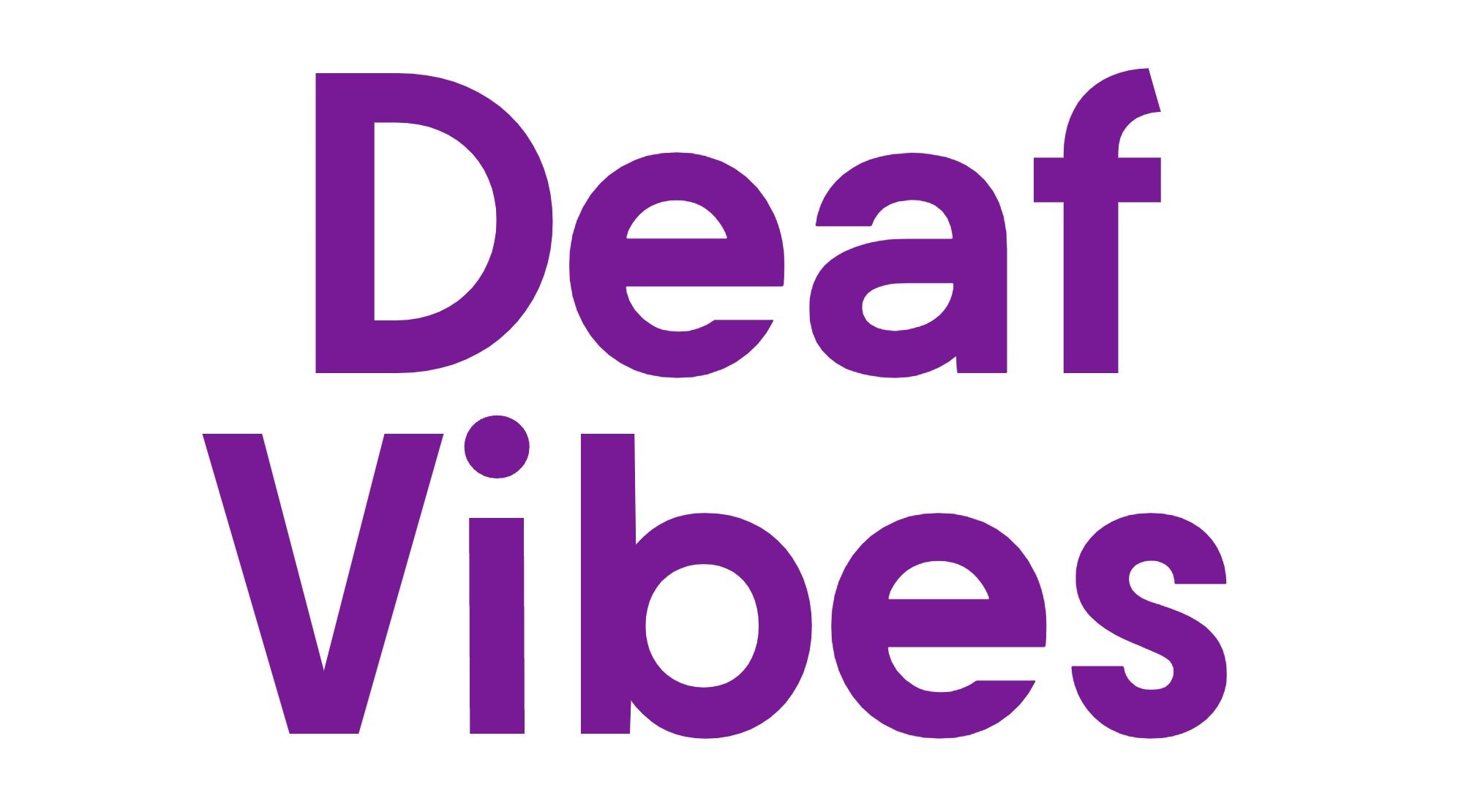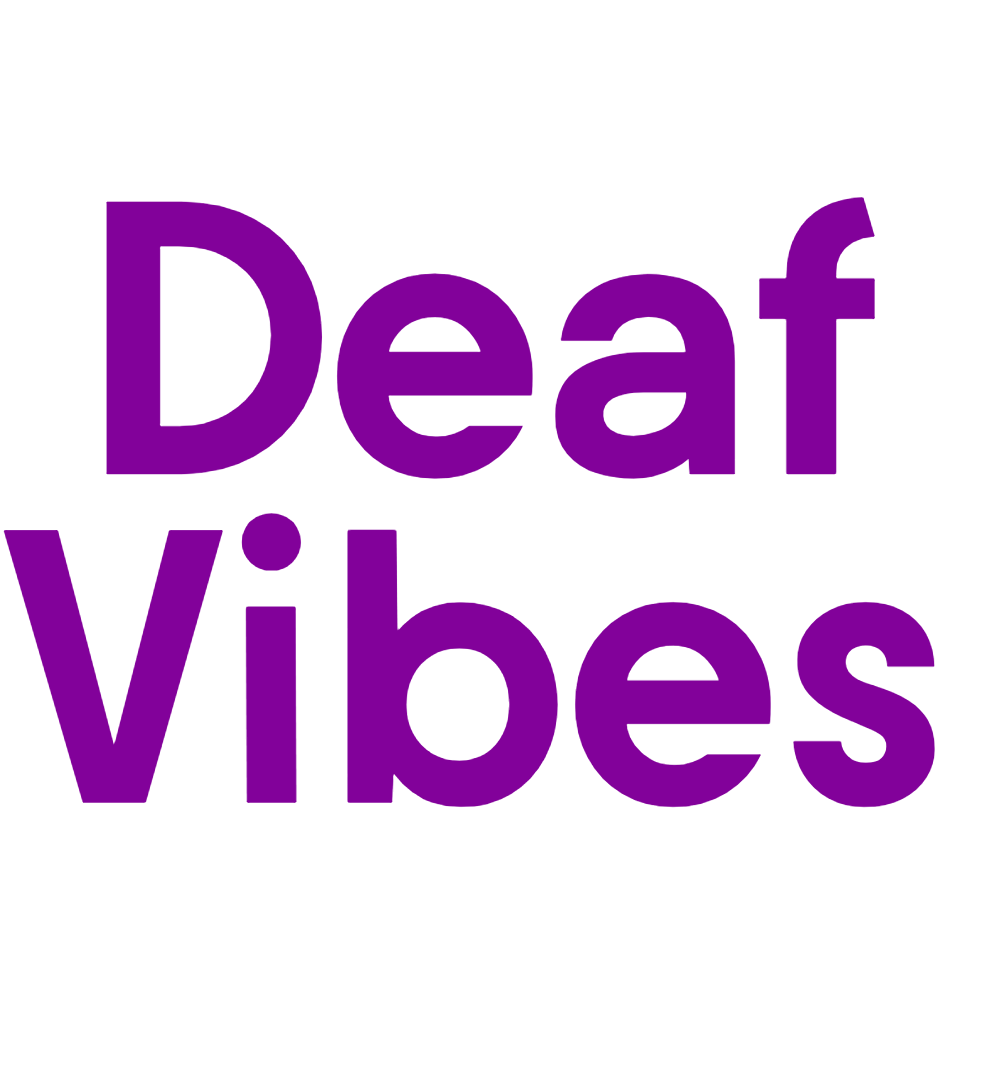Therapies and Interventions
Bilingual Speech Therapy: Understanding the Benefits
Tapping into the power of bilingual speech therapy can unlock a world of cognitive, cultural, and academic advantages – find out how!
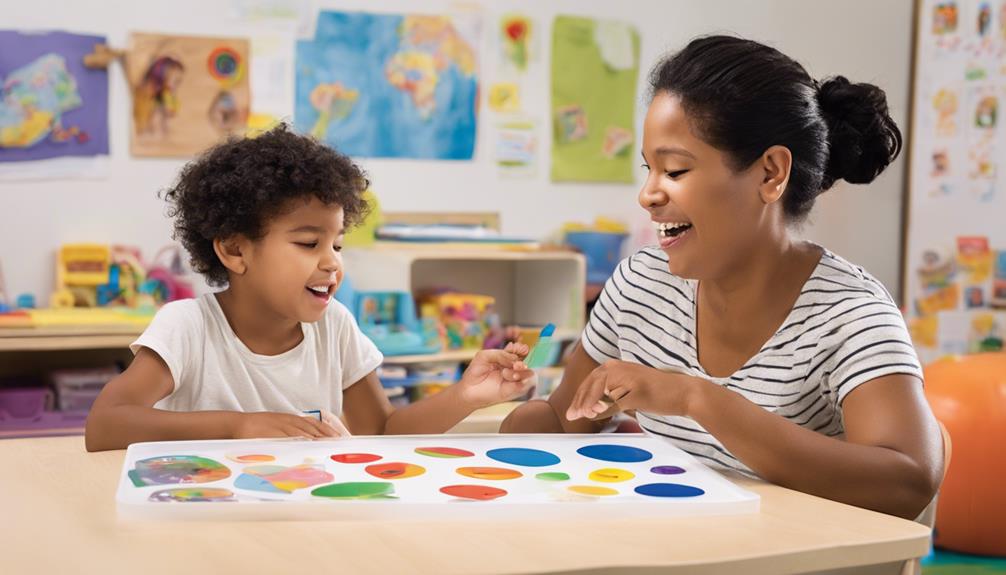
In the context of bilingual speech therapy, it’s akin to opening a portal to a wealth of benefits that await exploration. These advantages surpass just linguistic capabilities; they span into areas of cognitive development, cultural understanding, and educational success.
But what exactly makes this form of therapy so unique and beneficial? Let's explore the intricacies of how bilingual speech therapy can revolutionize the way we approach language development and communication challenges.
Key Takeaways
- Enhances communication skills and boosts confidence in bilingual individuals
- Preserves cultural identity while improving cognitive abilities
- Provides cognitive growth and social benefits through bilingual therapy
- Facilitates learning of additional languages and delays cognitive decline
Advantages of Bilingual Speech Therapy
Bilingual speech therapy offers significant advantages for individuals seeking to improve their communication skills in multiple languages. One of the key benefits of bilingual speech therapy is its focus on expressive language development. By targeting expressive language skills in both languages, individuals can enhance their ability to convey their thoughts and emotions effectively. This targeted approach not only improves communication skills but also boosts confidence in using both languages in various social and academic settings.
Moreover, bilingual speech therapy provides a unique opportunity for individuals to maintain their cultural connections and relationships. By incorporating the primary language into therapy sessions, bilingual individuals can preserve their cultural identity while improving their communication skills. This dual focus on language and culture enhances the overall effectiveness of the therapy and fosters a deeper sense of belonging and understanding for the individual.
In essence, the advantages of bilingual speech therapy extend beyond just communication skills. They encompass a holistic approach that considers language, culture, and social interactions, ultimately leading to improved cognitive abilities and enhanced social relationships.
Cognitive Benefits of Bilingualism

Accessing multiple languages has been shown to enhance mental sharpness and cognitive abilities, with bilingualism potentially delaying or preventing Alzheimer's disease. Research indicates that bilingualism offers cognitive benefits, such as improved memory and problem-solving skills, which can help in maintaining brain health as individuals age. Studies have found a positive correlation between bilingualism and a reduced risk of developing Alzheimer's disease, suggesting that the mental exercise involved in speaking multiple languages may act as a protective factor for cognitive decline.
Furthermore, bilingual individuals demonstrate enhanced auditory skills, including improved speech sound perception and pitch recognition. This heightened auditory processing not only aids in language comprehension but also contributes to overall cognitive function. Additionally, bilingualism may facilitate the learning of a third language more easily due to the cognitive advantages gained from managing multiple languages. Embracing bilingualism can thus lead to a sharper mind and potentially lower the risk of cognitive disorders, making it a valuable asset for cognitive health and wellbeing.
Cultural Awareness Enhancement
Enhancing cultural awareness in bilingual speech therapy involves incorporating language appreciation activities and utilizing multicultural communication strategies.
By understanding the cultural values and communication styles of bilingual individuals, therapists can create a more inclusive and effective therapy environment.
Recognizing and respecting diverse cultural norms and practices are essential components of providing culturally competent bilingual services in speech therapy.
Language Appreciation Activities
Engaging in language appreciation activities during bilingual speech therapy sessions enriches cultural awareness and sensitivity, fostering a deeper connection to heritage and enhancing language development. These activities, such as storytelling, traditional songs, and culturally relevant games, celebrate the diversity of language and culture.
By incorporating these elements into therapy sessions, bilingual individuals can improve their communication skills, boost confidence, and enhance self-expression. Embracing language appreciation activities not only benefits language development but also creates a supportive and inclusive environment where clients can thrive.
Through these activities, therapists can help their clients appreciate their heritage, understand different cultural perspectives, and develop a strong sense of identity within a multicultural society.
Multicultural Communication Strategies
To effectively support bilingual individuals in speech therapy, understanding and integrating multicultural communication strategies is paramount. When working with bilingual clients, cultural awareness plays a crucial role in providing effective therapy.
Here are four key strategies to enhance cultural awareness in bilingual speech therapy:
- Acknowledging diverse communication styles, values, and norms helps tailor therapy approaches to meet the specific needs of bilingual clients.
- Recognizing the impact of culture on language development enables speech therapists to devise more targeted intervention plans.
- Creating a culturally sensitive therapy environment fosters trust and rapport with bilingual clients and their families, leading to better treatment outcomes.
- Considering unique cultural backgrounds and communication preferences ensures culturally competent bilingual services that are responsive to individual needs.
Overcoming Communication Challenges
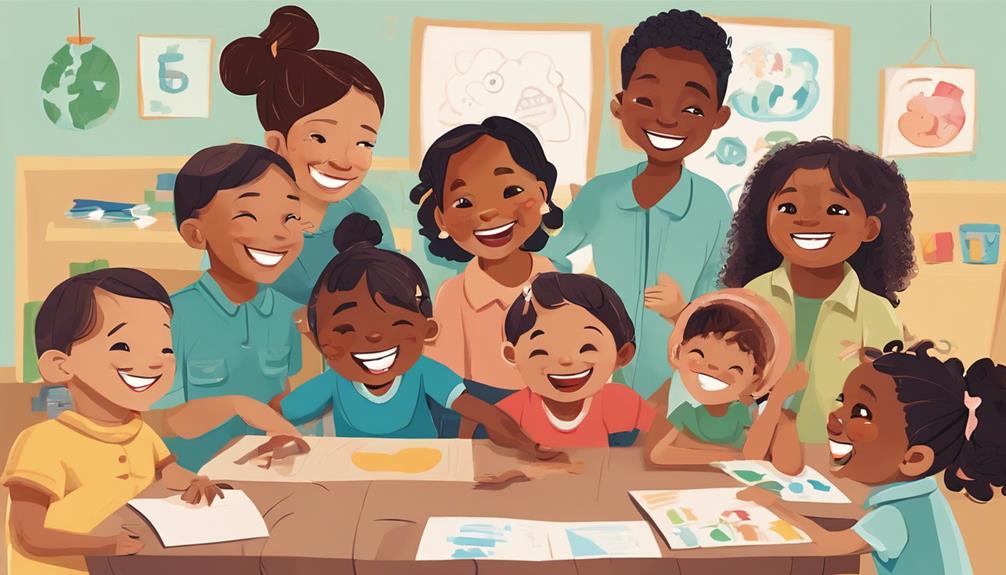
When facing communication challenges, bilingual speech therapy equips individuals with strategies to navigate language complexities. Our therapy approach emphasizes improving language skills while fostering cultural understanding, leading to enhanced communication outcomes.
Improved Language Skills
Addressing communication challenges in bilingual individuals, bilingual speech therapy enhances language skills by targeting phonological disorders, language mixing, articulation challenges, and code-switching. Through tailored intervention plans, bilingual speech therapy assists bilingual children in improving their language proficiency and overcoming communication obstacles.
Here are some ways bilingual speech therapy helps enhance language skills:
- Targeting Phonological Disorders: By focusing on sound production and speech patterns, bilingual speech therapy helps individuals improve their pronunciation and overall language clarity.
- Addressing Language Mixing: Bilingual speech therapy assists in separating languages to reduce mixing, enabling smoother communication in each language.
- Overcoming Articulation Challenges: By working on speech sound production, individuals can enhance their articulation and fluency in both languages.
- Managing Code-Switching: Bilingual speech therapy helps individuals control when and how they switch between languages, promoting clearer communication.
Cultural Understanding Benefits
Cultural understanding plays a pivotal role in enhancing communication outcomes within bilingual speech therapy by honoring diverse norms and values. Tailoring therapy to align with cultural practices fosters trust and engagement in bilingual clients. Recognizing cultural nuances promotes effective communication strategies and rapport building in therapy sessions. Culturally sensitive bilingual therapy acknowledges the impact of heritage on language development and communication patterns. Embracing cultural diversity in therapy settings enhances the overall effectiveness of bilingual speech therapy interventions.
| Cultural Understanding Benefits | ||
|---|---|---|
| Respecting diverse norms and values | Fosters trust and engagement | Promotes effective communication strategies |
Success Stories in Bilingual Therapy

In our experience as bilingual speech therapists, we've witnessed remarkable progress and positive outcomes in children's language development through bilingual therapy interventions. Success stories in bilingual therapy are a testament to the effectiveness of this approach in enhancing children's language skills, cognitive development, and communication abilities. Here are some key points highlighting the success stories we've encountered:
- Improved Language Skills: Children participating in bilingual therapy show enhanced proficiency in both languages, with increased vocabulary and better language fluency.
- Enhanced Cognitive Development: Bilingual therapy not only improves language skills but also boosts cognitive functions such as problem-solving and critical thinking.
- Better Communication Abilities: Through bilingual therapy, children exhibit improved articulation, speech clarity, and overall communication skills, leading to more effective interactions.
- Positive Academic Impact: Success stories reveal that children undergoing bilingual therapy demonstrate better academic performance and increased confidence in their abilities.
These success stories underscore the significant benefits of bilingual speech therapy in supporting children's overall development and well-being.
Family Challenges in Therapy
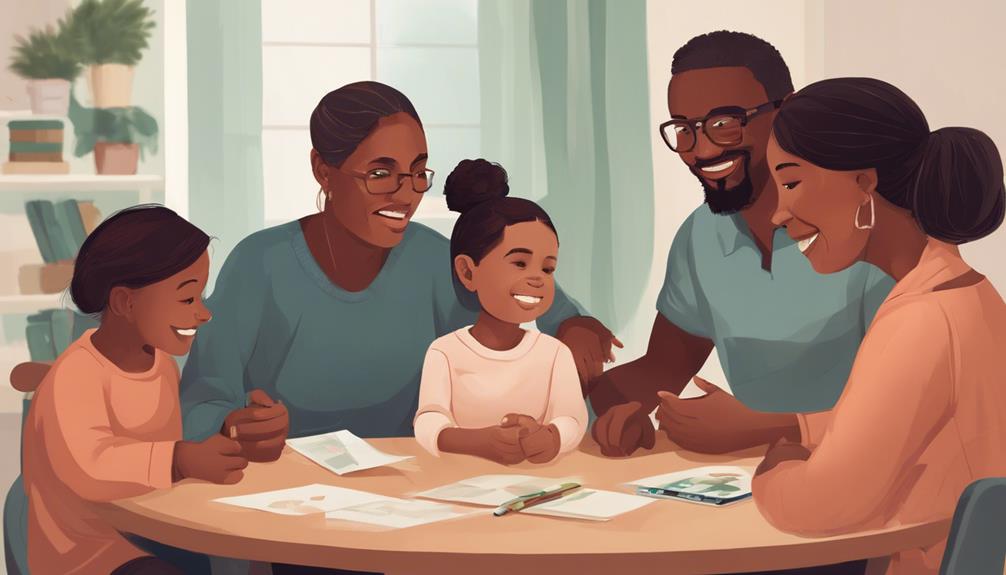
When addressing family challenges in bilingual speech therapy, it's important to emphasize the significance of family involvement in the therapeutic process. By actively involving families, communication barriers can be effectively addressed, leading to more successful outcomes.
Additionally, considering cultural aspects within therapy can further enhance the effectiveness of treatment.
Family Involvement Importance
Engaging with bilingual speech therapy can pose various challenges for families, such as juggling language use at home and navigating access to bilingual services. Family involvement plays a crucial role in supporting the child's progress and language development.
To address the challenges effectively, families must actively participate in the therapy process. Here are some key points highlighting the importance of family involvement in bilingual speech therapy:
- Balancing Language Use: Families may struggle to maintain consistent language use at home to reinforce therapy outcomes.
- Accessing Bilingual Services: Finding and accessing appropriate bilingual services can be a significant hurdle for families.
- Understanding Therapy Process: Clear communication with therapists is essential for families to understand the therapy goals and methods.
- Enhancing Effectiveness: Family support and active participation can enhance the effectiveness of bilingual speech therapy interventions.
Communication Barriers Addressed
Navigating the challenges of limited access to culturally competent therapists is a common obstacle for families in bilingual speech therapy. Language dominance shifts can complicate therapy progress, impacting bilingual children's ability to communicate effectively. Communication barriers may arise when families struggle to find bilingual speech therapy services, hindering the therapeutic process. Bilingual families often encounter difficulties navigating the healthcare system to access appropriate therapy, further impeding their child's progress. Additionally, the lack of resources and information in multiple languages can create obstacles in effective communication between families and therapists. Ensuring access to Spanish-speaking, culturally competent therapists is crucial to overcoming these challenges and providing quality bilingual speech therapy services.
| Common Obstacle | Solutions Available |
|---|---|
| Limited access to culturally competent therapists | Offering training on bilingual therapy |
| Language dominance shifts | Implementing individualized therapy plans |
| Communication barriers | Providing language interpretation services |
| Navigating the healthcare system | Offering guidance and support resources |
| Lack of resources in multiple languages | Creating multilingual educational materials |
Cultural Considerations in Therapy
In our bilingual speech therapy practice, understanding and respecting the cultural background of families is fundamental for achieving effective therapy outcomes. When addressing family challenges in therapy related to cultural considerations, we must be mindful of several key factors:
- Cultural Differences: Variances in communication styles and values can impact therapy dynamics.
- Language Dominance: Variations in language proficiency within bilingual homes may require tailored approaches.
- Culturally Sensitive Therapy: Creating an environment that acknowledges and respects cultural nuances enhances therapeutic relationships.
- Collaborative Approach: Open communication and collaboration with families help align intervention plans with cultural beliefs and practices.
Solutions for Family Challenges

To address family challenges in accessing bilingual speech therapy, utilizing telehealth services for remote support can be a beneficial solution. Telehealth allows families to connect with culturally competent therapists who can offer tailored solutions to support language development. These therapists understand the importance of language and cultural nuances in therapy, providing a more effective intervention for bilingual families.
In addition to telehealth services, families can advocate for bilingual therapy services, seek out resources, and actively engage in therapy sessions to maximize the benefits for their child. Accessing therapy in the native language is crucial for enhancing communication skills and overall language development. By staying informed through organizations like the American Speech-Language-Hearing Association (ASHA), families can navigate challenges more effectively and find the necessary resources to support bilingual speech therapy for their children.
Together, we can overcome barriers and ensure that every child receives the bilingual support they need for optimal communication development.
Accessing Bilingual Therapy Services
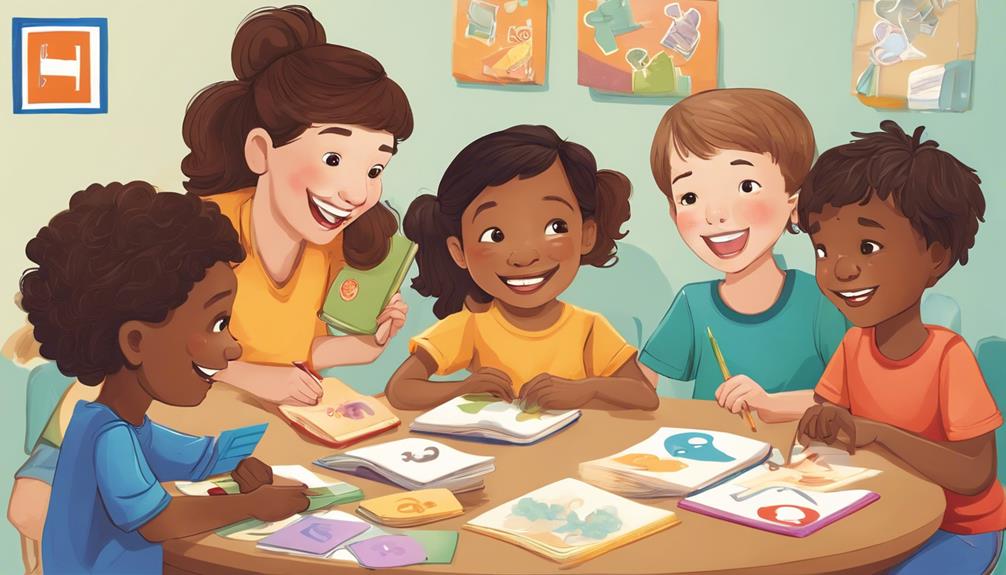
Accessing bilingual therapy services for children proficient in English and Spanish is essential for fostering comprehensive language support and enhancing communication skills. When seeking bilingual therapy services, consider the following:
- Tailored Approaches: Bilingual therapy services cater to the unique needs of bilingual individuals, offering therapy approaches in both English and Spanish to enhance overall communication skills effectively.
- Native Language Emphasis: Accessing therapy in the child's native language can optimize language development and therapeutic outcomes, as it provides a comfortable and familiar setting for effective communication.
- Speech Development Focus: Bilingual speech therapy services focus on speech development in both languages, ensuring that children can effectively communicate and express themselves in their bilingual environment.
- Seeking Professional Support: Connecting with a bilingual speech therapy team, such as Medical Support Services, can provide valuable insights and support tailored to your child's specific language needs, ensuring comprehensive language support for optimal outcomes.
Advocacy and Resources for Families
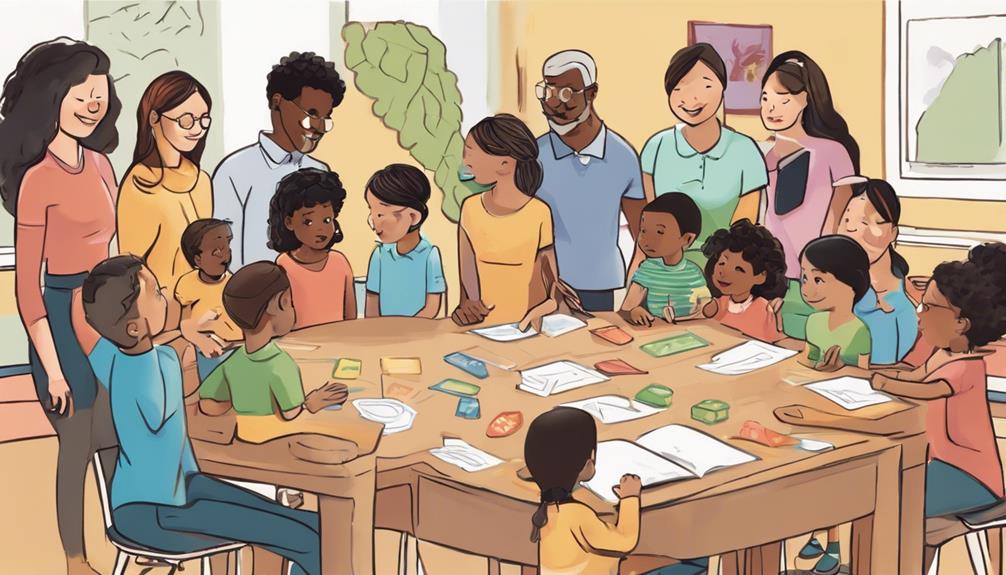
Families advocating for bilingual speech therapy services play a crucial role in ensuring culturally competent care for their children. By actively advocating for services that cater to language diversity, families can help their children receive the support they need for their communication development. Moreover, with the rise of telehealth services, accessing bilingual speech therapy has become more convenient for families in need, breaking down geographical barriers and providing greater flexibility.
To assist families in navigating bilingual speech therapy, organizations like the American Speech-Language-Hearing Association (ASHA) offer valuable resources and information. These resources can empower families to make informed decisions about their children's care and ensure they receive culturally competent therapy from professionals who understand and respect their language background.
The table below summarizes key points about advocacy and resources for families in bilingual speech therapy:
| Advocacy and Resources for Families |
|---|
| Families play a crucial role in ensuring culturally competent care. |
| Telehealth services provide convenient access to bilingual therapy. |
| Culturally competent therapists tailor interventions to language diversity. |
| ASHA offers resources to support families in navigating bilingual speech therapy. |
Connected Speech Pathology Benefits
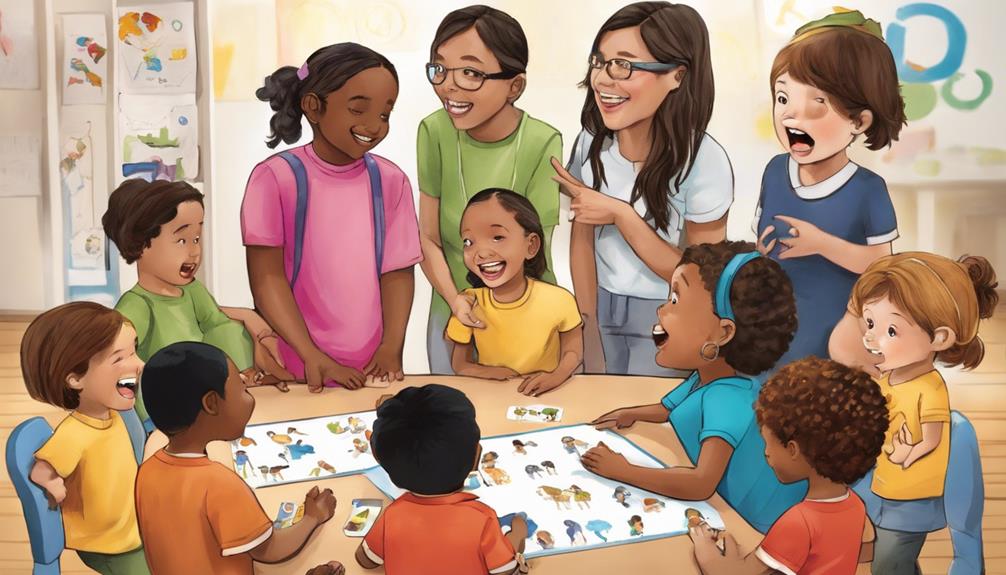
Advocating for culturally competent care in bilingual speech therapy lays the foundation for reaping the benefits of tailored therapy approaches like those offered at Connected Speech Pathology, which enhance communication skills in both English and Spanish.
At Connected Speech Pathology, we prioritize the development of language proficiency in bilingual individuals through our specialized services. Here are four ways our approach benefits our clients:
- Enhanced Communication Skills: Our bilingual speech therapy program focuses on improving communication abilities in both English and Spanish, allowing individuals to express themselves more effectively in various settings.
- Tailored Therapy Approaches: We design personalized treatment plans to address the unique needs of each client, ensuring that therapy sessions are relevant and impactful for improving language proficiency.
- Support for Bilingual Individuals: Our team at Connected Speech Pathology offers specialized support for bilingual clients, helping them strengthen their overall speech and language skills in a supportive environment.
- Effective Improvement: Accessing bilingual speech therapy services at Connected Speech Pathology can lead to substantial progress in communication abilities, benefiting individuals who speak multiple languages.
Frequently Asked Questions
What Are 5 Benefits of Being Bilingual?
We believe that being bilingual offers numerous advantages. These include improved problem-solving skills, enhanced multitasking abilities, and greater cognitive flexibility. Additionally, bilingual individuals have a competitive edge in job applications and international collaborations.
Bilingualism may also contribute to delaying or preventing Alzheimer's disease, maintaining mental sharpness. Learning a third language becomes easier for bilinguals, showcasing their advanced cognitive abilities. Lastly, bilingual brains excel in hearing speech sounds, enhancing auditory attention and processing.
What Are the Benefits of Bilingualism on Language Development?
Bilingualism enhances language development by boosting cognitive abilities and memory retention. It improves problem-solving skills, vocabulary acquisition, and categorization skills.
Research suggests that speaking multiple languages can delay Alzheimer's onset. Bilingual individuals also exhibit better auditory attention, speech sound discrimination, and pitch perception.
How Does Speaking Multiple Languages Benefits?
Speaking multiple languages benefits us like a bouquet of colorful flowers brightens a room. It enhances problem-solving skills, auditory abilities, and cognitive flexibility.
Bilingualism can delay Alzheimer's and makes learning a third language easier. Our thinking becomes more flexible, we categorize information better, and our cognitive abilities improve.
Embracing multiple languages offers a wealth of advantages that enrich our lives and sharpen our minds.
How Is Speech and Language Therapy Beneficial?
Speech and language therapy is beneficial as it targets communication difficulties, aiding in language development and social interactions.
Therapists use evidence-based techniques to improve speech clarity, language comprehension, and overall communication skills.
Through tailored interventions, individuals can enhance their ability to express thoughts and feelings effectively.
Therapy fosters confidence in communication, empowering individuals to navigate daily interactions with greater ease and success, promoting overall well-being.
Conclusion
In conclusion, the benefits of bilingual speech therapy are vast and impactful. From enhancing cognitive abilities to fostering cultural awareness, this form of therapy offers a unique opportunity for growth and development.
By providing support in both languages, individuals can overcome communication challenges and achieve academic success.
Stay tuned for more success stories and resources on how bilingual therapy can make a difference in your life and the lives of your loved ones.
Therapies and Interventions
10 Picture Scenes for Speech Therapy Success
Foster language growth and spark curiosity with 10 captivating picture scenes designed to revolutionize speech therapy outcomes.

Imagine stepping into a vibrant world where every picture scene is a gateway to improving speech therapy outcomes. These 10 carefully curated visuals offer a dynamic platform for enhancing communication skills in young learners.
From unraveling hidden mysteries to crafting intricate sentences, each scene holds a key to unlocking the potential of every speech therapy session. Explore the power of imagery and creativity in transforming language development with these engaging tools.
Key Takeaways
- Picture scenes aid in language development and storytelling skills.
- Visual aids enhance comprehension, engagement, and vocabulary.
- Language development strategies improve articulation and participation.
- WH question targeting boosts critical thinking and expressive language.
Action Picture Scenes
In our speech therapy sessions, we often rely on action picture scenes to engage our young learners and enhance their language skills effectively. These scenes are invaluable tools for targeting action vocabulary and expressive language development. By depicting various actions performed by people or animals, these scenes provide visual prompts that help children practice using new vocabulary words and forming sentences. Through these visual aids, we can stimulate storytelling skills and encourage the use of expressive language in our therapy sessions.
Utilizing action picture scenes allows us to make language learning more interactive and engaging for our young clients. The dynamic nature of these scenes captures the children's attention and facilitates their understanding of verbs and sentence formation. As speech therapists, we find that incorporating action picture scenes into our sessions not only makes the learning process more enjoyable but also significantly contributes to the children's language development.
Colorful Picture Scenes

When it comes to speech therapy, colorful picture scenes play a pivotal role in engaging young learners and fostering effective communication. These vibrant visual aids serve as powerful tools to stimulate language development and enhance vocabulary skills.
Visual Aids for Therapy
Utilizing colorful picture scenes in speech therapy sessions enhances object recognition and vocabulary development, creating an engaging and effective learning environment. Visual aids play a crucial role in speech therapy by making sessions more interactive and stimulating for clients.
Here are three key benefits of incorporating colorful picture scenes:
- Improved Understanding: Colorful visuals help in conveying new concepts more clearly, aiding in better comprehension during therapy sessions.
- Increased Engagement: The use of vibrant colors captures attention and motivates participants, leading to higher levels of involvement and enjoyment in activities.
- Enhanced Language Skills: Colorful picture scenes are particularly useful for practicing narrative skills, describing scenes, and working on WH questions, promoting the development of language abilities.
Engaging Communication Tools
Colorful picture scenes serve as powerful communication tools, enriching speech therapy sessions with enhanced engagement and accelerated language development. The vibrant visuals not only enhance object recognition but also facilitate picture naming, making learning more effective.
One of the best parts of using colorful picture scenes is their ability to improve understanding of new concepts and speed up reaction times, aiding in quicker progress during therapy. These materials are particularly motivating for children, increasing their participation and focus in sessions.
Stimulating Language Development
Enhancing language development through vibrant picture scenes is a proven strategy in speech therapy sessions, fostering engagement and accelerating learning outcomes. When it comes to speech therapy, incorporating colorful picture scenes can significantly benefit children's articulation and language skills.
- Colorful scenes help enhance object recognition and vocabulary development.
- The use of color facilitates understanding of new concepts and improves reaction times in children.
- Colorful materials are more rewarding and motivating for kids during speech therapy sessions.
Picture Hierarchy

Starting with concrete objects, picture hierarchy in speech therapy gradually progresses to abstract symbols like written words to support language development and communication goals. This sequential approach is essential for individuals undergoing speech therapy as it provides a structured path for learning and understanding language concepts. By beginning with tangible objects, such as toys or everyday items, clients can easily grasp basic vocabulary and concepts before advancing to more complex visual aids like color photographs and symbols. The use of varied materials, including black and white photographs and miniature objects, offers diverse learning experiences that cater to different learning styles.
As speech therapists, incorporating color drawings, symbols, and written words into sessions further enriches language development at various levels. This method not only aids in vocabulary expansion but also targets goals related to grammar and comprehension. Understanding and implementing the picture hierarchy allows therapists to tailor materials to individual needs effectively. By recognizing the importance of this hierarchy, therapists can create customized therapy plans that maximize progress and ultimately enhance communication skills.
Real Picture Scenes for Narratives

Let's talk about how real picture scenes can truly elevate the narrative skills of those in speech therapy.
By using authentic images, we can guide clients to craft detailed stories with a strong structure, fostering better language organization.
These scenes also encourage clients to hone their inferencing abilities and practice predicting outcomes based on visual cues.
Scene Descriptions for Stories
Real picture scenes serve as dynamic tools for cultivating narrative skills in speech therapy, fostering engaging storytelling abilities in clients. When using these scenes for story descriptions, therapists can guide clients to:
- Develop Detailed Stories: Real picture scenes encourage clients to create elaborate narratives by observing and interpreting the visual cues present.
- Enhance Language Skills: Through the process of describing the scenes, clients work on sequencing, describing, and inferencing, improving their overall narrative language abilities.
- Structure Compelling Narratives: Therapists can teach clients how to organize their stories effectively, incorporating key elements such as characters, settings, and plot developments.
Enhancing Language Skills
Enhancing language skills through the use of real picture scenes in therapy sessions provides concrete visual cues that aid in developing narrative abilities and fostering language proficiency. Real pictures serve as effective tools for targeting skills such as inferencing, predicting, describing, and answering WH questions.
By engaging students in storytelling activities, these scenes enhance expressive language abilities. Additionally, incorporating real photos supports vocabulary development and grammar skills through contextual learning. The use of real picture scenes not only makes learning language concepts more meaningful but also ensures an engaging therapeutic experience.
Therapists find that these visual prompts create a dynamic environment for language practice, helping individuals improve their communication skills in a practical and interactive manner.
Inferencing With Real Pictures

Utilizing authentic images in speech therapy sessions can greatly enhance clients' ability to infer and draw conclusions from visual stimuli. When incorporating real pictures for inferencing activities, clients can benefit in several ways:
- Developing Critical Thinking: Real pictures prompt clients to make educated guesses based on visual cues, fostering critical thinking skills essential for effective communication.
- Enhancing Problem-Solving Abilities: Engaging with real pictures encourages clients to make logical connections and draw conclusions, improving their problem-solving skills in various communication contexts.
- Practicing Predictive Skills: Real pictures provide context for inferencing tasks, allowing clients to practice predicting outcomes and drawing logical inferences based on the visual information presented.
Describing Real Pictures

Moving from inferring with real pictures to describing them involves honing our ability to articulate detailed observations and express them effectively in speech therapy sessions. Real pictures serve as invaluable tools in teaching descriptive language skills. By describing these images, clients can enhance their vocabulary and expressive language abilities. Encouraging clients to provide detailed and accurate descriptions of objects and scenes through real picture scenes can significantly boost engagement and motivation during therapy activities. Moreover, practicing the skill of describing real pictures aids in the development of observational and communication skills crucial for effective expression.
| Benefits of Describing Real Pictures | |
|---|---|
| Improves vocabulary | Enhances expressive language |
| Encourages detailed descriptions | Boosts engagement and motivation |
| Develops observational skills | Fosters effective communication |
Targeting WH Questions

When working on targeting WH questions, it's important to practice these questions consistently to build proficiency.
By applying specific WH question strategies, clients can strengthen their comprehension skills effectively.
Let's guide clients in utilizing these strategies to enhance their critical thinking abilities.
WH Questions Practice
In speech therapy sessions, we focus on targeting question words like who, what, where, why, and how through WH questions practice to enhance language skills and critical thinking abilities.
Here are three key benefits of WH questions practice in speech therapy:
- Develops Language Skills: By prompting clients to answer questions related to picture scenes, WH questions practice helps improve comprehension and expressive language abilities.
- Enhances Critical Thinking: Engaging with WH questions encourages clients to think critically about the content they're observing, leading to improved reasoning skills.
- Improves Communication: Utilizing WH questions in therapy sessions aids in enhancing communication skills, as clients are prompted to articulate their thoughts and ideas effectively.
Applying WH Strategies
Let's explore how applying WH strategies, specifically targeting WH questions, can significantly benefit speech therapy sessions. By focusing on who, what, where, when, why, and how, we enhance language comprehension and critical thinking skills. Using real picture scenes in therapy allows clients to practice answering WH questions effectively, improving inferencing, predicting, and storytelling abilities. This approach aids in developing expressive language skills and provides visual context for clients to understand and respond to different types of questions. Check out the table below to see how incorporating WH questions with picture scenes can create a dynamic and engaging therapy environment:
| Benefit | Description | Outcome |
|---|---|---|
| Enhanced Comprehension | Clients grasp information better through visual context | Improved understanding of the questions |
| Critical Thinking Skills | Encourages clients to think deeply about the scenario presented | Enhanced critical thinking abilities |
| Expressive Language Development | Helps clients articulate their thoughts and responses | Improved expressive language skills |
| Inferencing Practice | Clients learn to draw conclusions from visual cues | Strengthened inferencing skills |
| Storytelling Improvement | Enables clients to narrate stories based on the picture scenes | Enhanced storytelling abilities |
Vocabulary Building
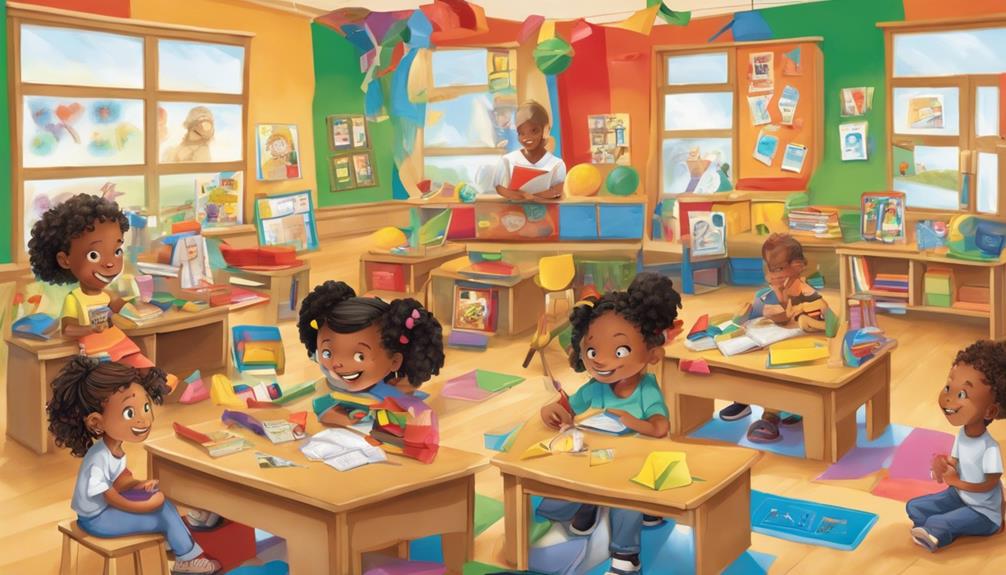
Utilizing picture scenes is an effective method for enhancing vocabulary skills during speech therapy sessions. Picture scenes offer a visual context that aids in teaching and reinforcing new words, ultimately improving understanding and retention. Here are three key ways in which vocabulary building through picture scenes can benefit speech therapy sessions:
- Enhanced Vocabulary Acquisition: Picture scenes provide a tangible reference point for clients to associate with new words, making it easier for them to grasp the meaning and usage of these terms.
- Interactive Learning Experience: By incorporating picture scenes, therapy sessions become more engaging and interactive, fostering a dynamic learning environment that encourages active participation and retention of vocabulary.
- Expanded Vocabulary Repertoire: Visual aids like picture scenes help expand a client's vocabulary repertoire effectively, enabling them to express themselves more fluently and accurately in various contexts.
Sentence Formulation Practice

Engaging in sentence formulation practice with picture scenes enhances our expressive language skills effectively during speech therapy sessions. This activity allows us to describe hidden objects within the scenes using complete sentences, fostering vocabulary growth and improving grammar and sentence structure.
The visual support from the picture scenes aids us in accurately constructing descriptive sentences, making the learning process more accessible and engaging. Sentence formulation practice with picture scenes is particularly beneficial for preschool and elementary students working towards achieving language goals.
Grammar Practice

Enhancing our grammar skills through interactive picture scenes adds a dynamic element to speech therapy sessions. By incorporating grammar activities into these engaging visuals, we can effectively improve language skills and comprehension.
Here's why grammar practice within picture scenes is beneficial:
- Visual Context: Picture scenes provide a visual context for grammar concepts, making learning more interactive and fun.
- Targeted Language Goals: Using picture scenes for grammar practice allows us to target specific language goals in a meaningful and personalized way.
- Enhanced Skills: Grammar practice within picture scenes not only improves grammar but also enhances articulation, vocabulary, and sentence structure skills.
With these benefits in mind, integrating grammar practice into picture scenes can significantly enhance the effectiveness of speech therapy sessions, making learning both enjoyable and productive.
Frequently Asked Questions
How Do You Use Picture Scenes in Speech Therapy?
We use picture scenes in speech therapy to enhance language skills and boost engagement. By providing visual prompts, we create a context for practicing articulation, forming sentences, and storytelling.
These scenes help target specific goals like describing, inferencing, and answering WH questions. Children love the interactive nature of these sessions, making therapy enjoyable. Real pictures in our materials aid comprehension and retention for students of all ages.
What Are Picture Scenes and Sentence Formulation?
Picture scenes and sentence formulation involve using visual prompts to help clients develop their descriptive language skills.
By observing scenes with various objects and characters, clients can practice constructing detailed sentences. This process enhances expressive language, vocabulary, and storytelling abilities.
Engaging with picture scenes encourages clients to create meaningful sentences, fostering communication skills.
Through this practice, clients can improve their language production and sentence structure in speech therapy sessions.
What Is the Success Rate of Speech Therapy?
The success rate of speech therapy varies depending on the individual's condition and therapy goals. Research indicates that speech therapy can be highly effective in enhancing communication skills for many. Success is often gauged by improvements in speech clarity, language development, and communication effectiveness.
Early intervention and regular therapy sessions are crucial for positive outcomes. Incorporating engaging materials like picture scenes can further boost the success of speech therapy by promoting effective learning.
What Are the Visual Cues for Speech Therapy?
Visual cues in speech therapy encompass pictures, gestures, and other aids that support communication and language development. These tools enhance articulation, vocabulary, and overall communication skills for individuals with speech and language disorders.
They improve understanding, engagement, and learning during therapy sessions. Visual cues are especially beneficial for those struggling with auditory processing or verbal instructions.
Incorporating these cues makes learning interactive, effective, and enjoyable for clients of all ages.
Conclusion
In the vibrant world of speech therapy, these 10 picture scenes serve as colorful windows of opportunity for young learners to explore language skills. Like a painter adding brushstrokes to a masterpiece, these scenes help children develop their speech and communication abilities with creativity and joy.
With each scene, hidden treasures of language are uncovered, painting a path towards success in speech therapy.
Therapies and Interventions
10 Auditory Memory IEP Goals for Speech Therapy Success
Get ready to supercharge auditory memory skills with these 10 targeted IEP goals in speech therapy.
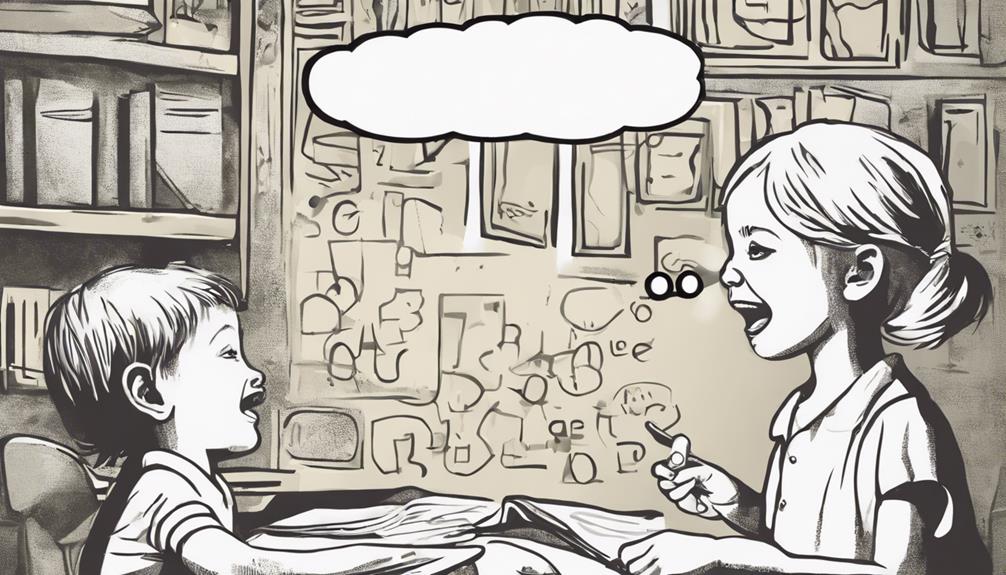
Enhancing auditory memory in speech therapy is vital for children's cognitive development.
With 10 targeted IEP goals focusing on auditory memory skills, therapists can help children achieve success in recalling and processing spoken information effectively.
From improving memory span to enhancing attention and sequencing abilities, these goals aim to strengthen auditory processing speed and memory recall.
By tailoring goals to each child's unique needs and monitoring progress, therapists play a crucial role in enhancing auditory memory skills.
Key Takeaways
- Set specific auditory memory goals in IEP for targeted improvement.
- Use repetition and association techniques to strengthen memory recall.
- Engage in multi-sensory activities to enhance auditory memory development.
- Incorporate auditory sequencing tasks to improve working memory skills.
Developing Auditory Attention Skills
Developing auditory attention skills is crucial in speech therapy for enhancing the ability to focus on and remember auditory information effectively. In speech therapy, we focus on improving auditory memory through targeted activities and exercises tailored to each individual's needs. By practicing skills such as repeating spoken words, following instructions, and accurately recalling auditory information, we aim to strengthen auditory attention abilities. These skills are vital not only for academic success but also for navigating social interactions and daily communication with confidence.
Individualized Education Program (IEP) goals often include objectives related to auditory memory enhancement. By setting specific targets for improving auditory attention skills within the IEP, we can track progress and tailor interventions accordingly. Speech therapists work closely with individuals with speech and language difficulties to design activities that challenge and strengthen their auditory memory capacities. As progress is made in developing auditory attention skills, individuals typically demonstrate improved abilities to recall, follow, and repeat spoken information accurately, leading to enhanced communication and overall well-being.
Improving Auditory Discrimination Abilities
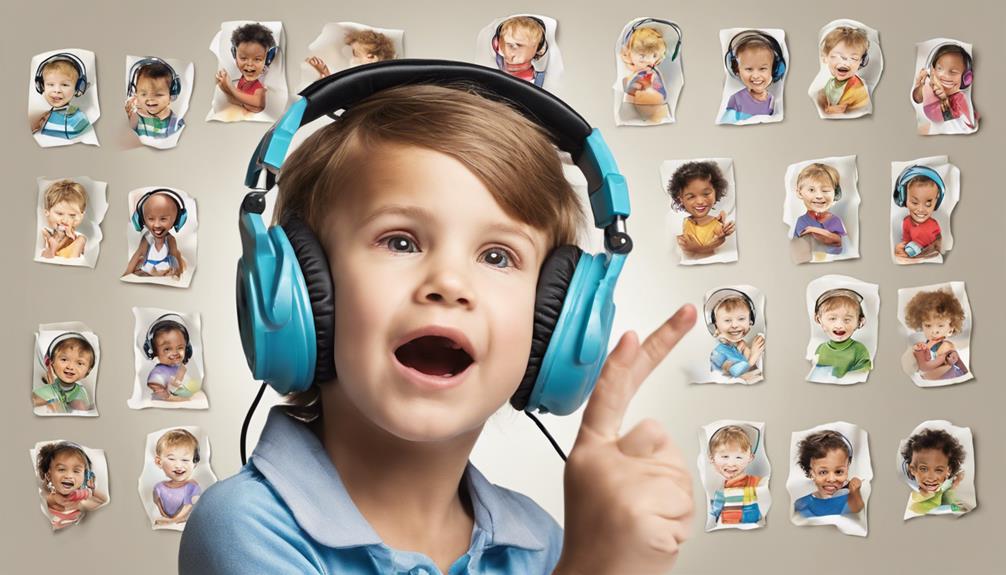
Improving auditory discrimination abilities is essential for enhancing speech and language skills in therapy sessions. Auditory discrimination involves the ability to differentiate between similar sounds or words, a crucial skill in speech therapy. By targeting auditory discrimination through specific auditory memory IEP goals, individuals can learn to distinguish speech sounds accurately.
This training is particularly beneficial for those with auditory processing disorders, as it can improve comprehension and communication during therapy sessions. Enhancing auditory discrimination not only aids in recognizing subtle differences in sounds but also contributes to overall speech and language development. Speech therapists focus on honing these skills to ensure that individuals can effectively distinguish between various speech sounds, leading to improved auditory memory and better speech outcomes in therapy.
Through dedicated practice and targeted interventions, individuals can make significant strides in their auditory discrimination abilities, ultimately enhancing their overall speech therapy experience.
Enhancing Auditory Sequencing Proficiency
Enhancing auditory sequencing proficiency is a vital component of advancing speech and language skills in therapy sessions. It involves the ability to accurately recall and repeat a sequence of auditory information, which is essential for following instructions, understanding narratives, and retaining information in the correct order.
When setting IEP goals for auditory sequencing, focusing on improving working memory skills can enhance the accuracy and speed of recalling spoken sequences. These goals may include tasks like repeating spoken numbers, recalling lists in order, or reproducing sequences of sounds accurately.
Strengthening Auditory Memory Recall
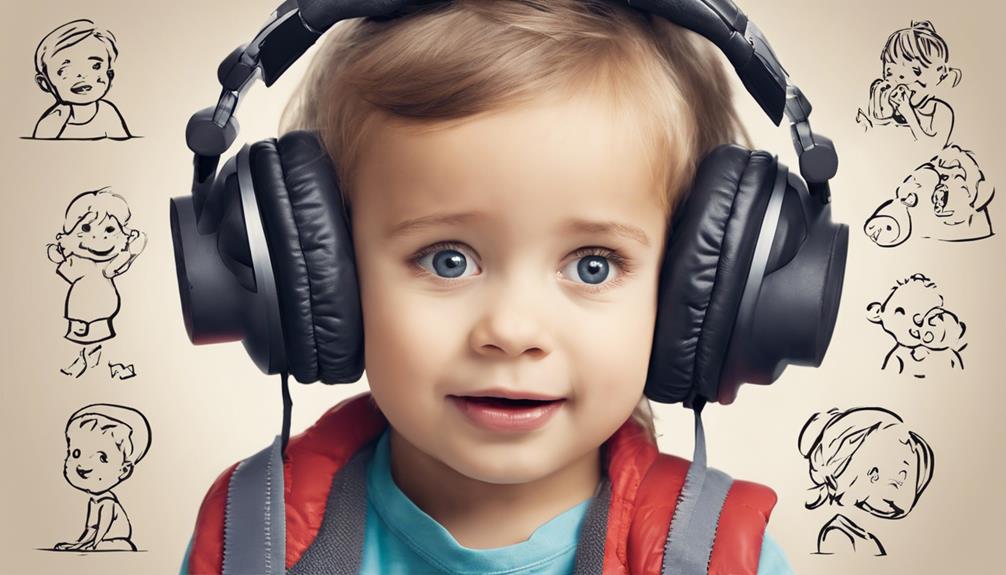
While addressing auditory memory recall, we aim to strengthen the ability to accurately retain and recall spoken information. This is crucial for achieving success in academic and daily life tasks. Here are three key strategies to enhance auditory memory recall through IEP goals in Speech Therapy:
- Repetition: Encouraging repetition of spoken information helps reinforce memory recall and retention.
- Association Techniques: Teaching individuals to associate new information with existing knowledge can aid in memory recall.
- Multi-Sensory Activities: Engaging multiple senses during learning, such as combining visual aids with auditory input, can improve memory recall abilities.
Building Auditory Processing Speed
Addressing auditory processing speed involves implementing targeted exercises and strategies to enhance the interpretation and response time to auditory information. As Speech Language Pathologists, setting specific IEP goals aimed at improving auditory processing speed is crucial. By incorporating activities that challenge quick processing of auditory information, individuals can strengthen their ability to understand and respond promptly in various situations. These exercises may include listening to rapid speech, following multi-step directions, and engaging in activities that require quick auditory discrimination.
Improving auditory processing speed can significantly benefit individuals in academic settings, social interactions, and overall communication skills. Through consistent practice and tailored interventions, individuals can enhance their ability to process auditory information efficiently. Setting clear IEP goals focused on building auditory processing speed can lead to improved academic outcomes, better comprehension of verbal instructions, and enhanced participation in conversations. By working collaboratively with Speech Language Pathologists, individuals can make strides in developing this essential skill for effective communication.
Enhancing Auditory Comprehension Skills

Our focus lies in honing the essential auditory comprehension skills necessary for effective communication and interaction. When it comes to setting IEP goals for improving auditory memory in speech therapy, enhancing auditory comprehension skills is crucial.
Here are some strategies to achieve this:
- Repetition: Repeating information helps reinforce understanding and retention.
- Visual aids: Utilizing visual tools alongside spoken information can aid in comprehension.
- Chunking information: Breaking down spoken content into smaller, manageable chunks facilitates better understanding.
In speech therapy sessions, IEP goals may include tasks such as recalling spoken instructions, following auditory directions, and summarizing spoken content. Progress in enhancing auditory comprehension skills not only improves communication but also boosts academic performance and social interactions.
Improving Auditory Memory Span
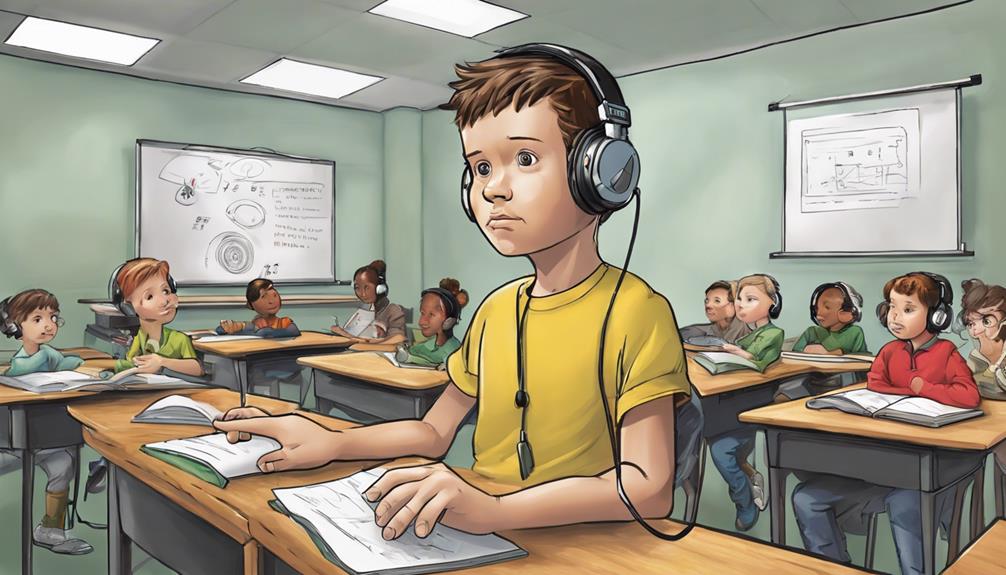
To enhance auditory memory span, it is essential to implement targeted strategies that focus on improving the ability to recall and repeat sequences of spoken information accurately. Setting IEP goals for auditory memory span involves tasks such as recalling spoken words, following instructions, and repeating numbers. Effective strategies for improving auditory memory span include repetition, chunking information, and using mnemonic devices. Progress in auditory memory span can be measured through assessments, observations, and data collection to track improvements over time.
| Strategies for Improving Auditory Memory Span | Examples |
|---|---|
| Repetition | Repeating sequences of numbers or words multiple times. |
| Chunking Information | Grouping information into smaller, manageable chunks. |
| Mnemonic Devices | Using memory aids like acronyms or visualization techniques. |
| Data Collection | Recording performance on memory tasks to monitor progress. |
Enhancing Auditory Memory for Instructions
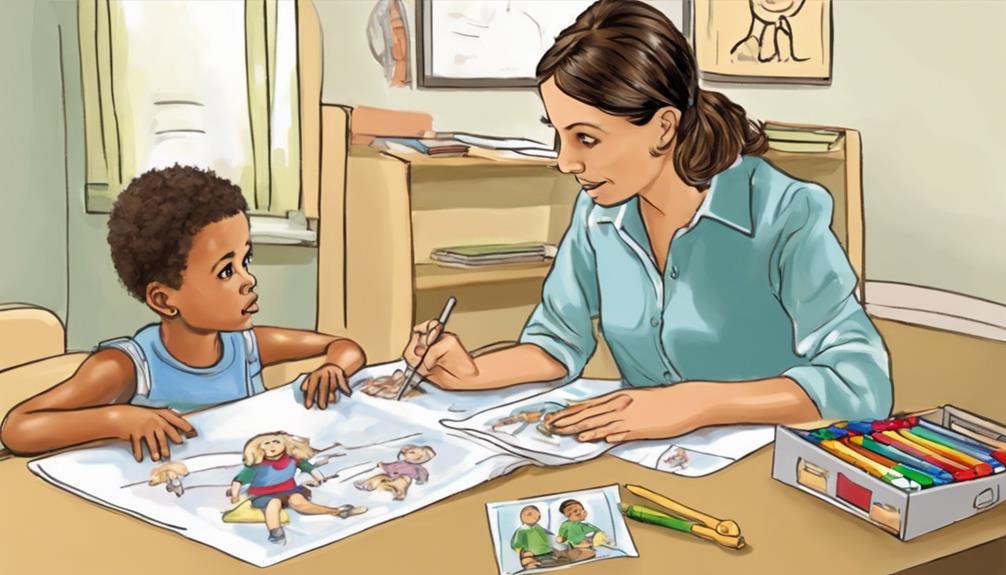
Enhancing auditory memory for instructions involves honing the ability to accurately retain and recall spoken directives. When setting IEP goals for auditory memory in speech therapy, it's crucial to focus on improving the capacity to follow and execute multi-step directions effectively.
To enhance auditory memory for instructions, consider the following strategies:
- Repetition: Encourage repeating instructions to reinforce memory retention.
- Chunking Information: Break down complex instructions into smaller, manageable chunks.
- Visual Aids: Utilize visual cues or diagrams to support auditory memory development.
Strengthening Auditory Memory for Details

As speech therapists, we recognize the importance of strengthening auditory memory for remembering intricate details effectively.
By implementing detail retention strategies, individuals can enhance their memory skills and improve their ability to recall specific information accurately.
These techniques play a crucial role in supporting better comprehension and retention of crucial details in various conversations and instructions.
Detail Retention Strategies
Implementing repetition and rehearsal techniques is fundamental in strengthening auditory memory for details. To enhance detail retention, we recommend the following strategies:
- Encourage summarizing information actively to improve retention.
- Utilize visual aids and graphic organizers to support memory recall.
- Break down complex information into smaller, manageable chunks for better processing.
Enhancing Memory Skills
How can we effectively strengthen auditory memory for details in speech therapy to enhance memory skills?
Strengthening auditory memory skills is crucial for individuals to accurately recall and retain specific details from spoken information. This enhancement plays a vital role in facilitating the ability to follow multi-step directions with precision.
By developing auditory memory abilities, individuals can better remember sequences of unrelated spoken syllables and reproduce complex spoken sentences more accurately. Speech therapy focused on strengthening auditory memory can significantly improve an individual's capacity to retain and recall important details, such as phone numbers or instructions.
Setting IEP goals that target enhancing auditory memory skills can lead to notable advancements in an individual's ability to process and remember information effectively.
Developing Auditory Memory for Conversations

Improving auditory memory for conversations involves actively engaging in strategies that enhance the retention and recall of spoken information.
When working towards developing auditory memory skills specifically for conversations in speech therapy, it's crucial to focus on the following key points:
- Recalling Spoken Information: Practice recalling details from recent conversations to improve memory retention.
- Participating Actively: Engage in conversations by listening attentively and responding appropriately to strengthen auditory memory.
- Summarizing Discussions: Summarize conversations after they occur to reinforce memory and understanding of the content.
Frequently Asked Questions
What Are the Memory Strategies Goal for Speech Therapy?
In speech therapy, we focus on memory strategies to improve auditory memory skills. These goals help us recall and retain spoken information like words and instructions.
By using exercises like repetition and mnemonic devices, we can enhance memory. Visual aids and chunking info also support auditory memory.
Setting measurable goals allows us to track progress and customize interventions for effective therapy. These strategies lead to better communication and language development.
What Are the Goals for Auditory Discrimination in Speech Therapy?
In speech therapy, our goals for auditory discrimination focus on improving the ability to differentiate between similar sounds or words. By enhancing listening skills, phonemic awareness, and speech sound discrimination, we aim to strengthen auditory processing essential for speech and language development.
Specific objectives may include distinguishing between minimal pairs like 'pat' and 'bat' or 'ship' and 'sip.' Achieving these goals can lead to enhanced communication, speech clarity, and overall language proficiency.
What Is the Goal of Auditory Closure Speech Therapy?
We aim to enhance auditory closure skills in therapy to boost comprehension and communication. By filling in missing parts of spoken information, we help improve listening accuracy and memory.
Success in this area can lead to better academic performance and social interactions. It's a vital aspect of speech therapy that aids in overall language development.
What Are the IEP Goals for Phonological Memory?
We aim to enhance phonological memory through IEP goals. These goals target the ability to process and recall auditory information accurately. Objectives include improving word retention, following spoken instructions, and recalling sound sequences.
Strengthening auditory processing skills aids in effective communication and learning. By setting measurable phonological memory goals, individuals with auditory challenges can develop strategies for better information retention and retrieval.
These goals in an IEP can lead to improved speech therapy outcomes and academic success.
Conclusion
In conclusion, setting auditory memory IEP goals in speech therapy is essential for helping children improve their ability to recall spoken information accurately.
Just like a musician fine-tuning their ear to play a perfect melody, these goals help children sharpen their listening skills to better understand and retain information.
By focusing on specific auditory memory skills tailored to each child's needs, speech therapists can guide them towards success in communication and learning.
Jamie is one of the creative forces behind the words that resonate with our audience at Deaf Vibes. With a passion for storytelling and advocacy, Jamie delves into topics that matter deeply to the deaf and hard-of-hearing community. Jamie’s articles are crafted with empathy, insight, and a commitment to positive change, from exploring the latest advancements in hearing technologies to shedding light on the everyday challenges and victories of those within the community. Jamie believes in the power of shared stories to inspire action, foster understanding, and create a more inclusive world for everyone.
Therapies and Interventions
5 Auditory Comprehension Therapy Techniques for Better Understanding
Step into the world of auditory therapy techniques that can revolutionize your comprehension skills, starting with discrimination exercises and memory strategies – discover what's next!

As we explore auditory comprehension therapy techniques for better understanding, you might not be aware of the impactful methods that professionals employ to enhance this crucial skill.
From specific exercises targeting discrimination to strategies focusing on memory and context clues, the realm of auditory therapy holds numerous tools waiting to be discovered.
By uncovering these techniques, individuals can unlock a world of improved communication and learning abilities.
Key Takeaways
- Auditory Discrimination Training enhances sound differentiation for improved understanding.
- Following Directions Exercises boost listening skills and academic performance.
- Memory enhancement techniques like repetition and visualization aid in better comprehension.
- Active Listening Strategies, including asking clarifying questions, improve communication skills effectively.
Auditory Discrimination Training
In Auditory Discrimination Training, we focus on enhancing individuals' ability to differentiate between various sounds or words to improve comprehension. This therapy technique is crucial in speech therapy as it helps individuals with language processing difficulties. By engaging in exercises that require distinguishing subtle differences in auditory stimuli, individuals can improve their auditory comprehension skills. For those with aphasia or other communication disorders, Auditory Discrimination Training plays a vital role in sharpening their listening abilities.
Through targeted activities and practice, individuals can strengthen their auditory discrimination, leading to better interpretation of spoken language. By honing these skills, individuals can enhance their overall auditory processing abilities, resulting in improved understanding and communication. This training method is designed to assist individuals in accurately perceiving and interpreting auditory information, ultimately aiding in their language comprehension. In the realm of Speech Therapy, Auditory Discrimination Training is a fundamental technique for enhancing auditory comprehension and communication skills.
Following Directions Exercises

Engaging in following directions exercises enhances auditory comprehension skills in children, fostering improved understanding and academic performance. These exercises are crucial for improving communication and addressing auditory comprehension deficits in children. By practicing following directions tasks, children can develop compensatory strategies to overcome challenges in understanding instructions.
Here is a table highlighting the benefits of following directions exercises for improving auditory comprehension:
| Benefits of Following Directions Exercises |
|---|
| Helps improve listening skills |
| Enhances ability to process information |
| Boosts academic performance |
| Provides targeted practice for specific difficulties |
| Fosters effective communication skills |
To help your child improve their auditory comprehension, incorporating following directions exercises into their routine can make a significant difference. Consistent practice and support are key in helping children develop these essential skills for better communication and academic success.
Auditory Memory Enhancement Techniques
Transitioning from following directions exercises, auditory memory enhancement techniques focus on improving retention and recall of auditory information through strategies like repetition, visualization, and chunking. These techniques aim to increase auditory comprehension by strengthening auditory processing and memory.
Here are some key points to consider:
- Repetition: Repeating information helps reinforce memory and aids in better retention of spoken details.
- Visualization: Creating mental images of the information being heard can enhance memory recall.
- Chunking: Breaking down information into smaller, manageable chunks improves the ability to process and remember larger amounts of data.
- Overall Improvement: Implementing auditory memory enhancement techniques can lead to better language comprehension, reduced communication breakdowns, and improved learning outcomes.
Context Clue Utilization

Utilizing context clues enhances comprehension by analyzing surrounding information to decode unfamiliar words or phrases. Context clue utilization plays a critical role in language processing, especially for individuals with global aphasia.
When faced with written directions or unfamiliar terms, understanding context clues can aid in deciphering meanings and enhancing overall comprehension. As Speech-Language Pathologists, we often encourage patients to pay close attention to details such as tone, setting, or related words to infer the intended message.
By honing this skill, individuals can fill in gaps in understanding and improve their ability to grasp information more effectively. Context clue utilization is a valuable technique that provides additional context to support individuals in interpreting language and communicating more clearly.
Developing proficiency in identifying and interpreting context clues can significantly boost auditory comprehension skills and empower individuals to navigate various communication scenarios with greater ease.
Active Listening Strategies
Active listening strategies play a crucial role in enhancing comprehension and communication effectiveness by incorporating techniques such as maintaining eye contact and providing verbal cues to show engagement. When practicing active listening, remember to:
- Ask clarifying questions: This demonstrates your interest and ensures you understand the spoken language accurately.
- Paraphrase what you heard: Summarizing the speaker's words not only confirms your understanding but also shows that you're actively engaged in the conversation.
- Reflect on emotions and body language: Paying attention to non-verbal cues enhances comprehension and helps in responding appropriately.
- Practice regularly: Consistent use of active listening techniques can be particularly beneficial for individuals with Wernicke's aphasia or other communication disorders. Speech-Language Pathologists often recommend these strategies to improve overall communication skills.
Frequently Asked Questions
How Do You Improve Auditory Comprehension?
Improving auditory comprehension involves using strategies like chunking and visualization, which enhance understanding in children. Tailored support from Speech-Language Pathologists is vital for implementing these techniques effectively.
Repetition is key in developing auditory comprehension skills. By employing teaching methods such as chunking and visualization, children can better grasp information, aiding in academic success.
Strong auditory comprehension skills are crucial for improved academic performance and readiness for future educational challenges.
What Are Auditory Comprehension Activities?
When it comes to auditory comprehension activities, they involve tasks like listening to instructions, following directions, and answering questions based on spoken information. These exercises target enhancing understanding of verbal cues, improving listening skills, and increasing retention of auditory information.
Examples of such activities include story listening, auditory memory games, and comprehension exercises. Engaging in these activities helps individuals develop language skills, boost communication abilities, and enhance overall cognitive function.
How Can I Improve My Auditory Attention?
We can improve auditory attention by practicing active listening techniques, minimizing distractions, using visual aids, and engaging in activities that require following verbal instructions.
Seeking guidance from Speech-Language Pathologists can provide tailored strategies to enhance auditory attention.
By focusing on the speaker's words, maintaining eye contact, and staying alert, we can strengthen our ability to comprehend auditory information effectively.
These simple strategies can make a significant difference in improving auditory attention.
How Can I Improve My Auditory Sense?
Improving our auditory sense involves engaging in activities that challenge our listening skills.
We can practice active listening by focusing on the speaker and using visual aids to support our understanding.
Seeking guidance from a speech-language pathologist can provide tailored strategies for enhancing our ability to interpret spoken language effectively.
Conclusion
In conclusion, mastering auditory comprehension therapy techniques is like unlocking a treasure trove of understanding. By incorporating strategies like:
- Auditory discrimination training
- Following directions exercises
- Auditory memory enhancement techniques
- Context clue utilization
- Active listening strategies
Individuals can open the doors to clearer communication and improved learning experiences.
These techniques serve as powerful tools to enhance comprehension skills and navigate the world with confidence. Embrace these techniques and watch your understanding soar to new heights.
Jamie is one of the creative forces behind the words that resonate with our audience at Deaf Vibes. With a passion for storytelling and advocacy, Jamie delves into topics that matter deeply to the deaf and hard-of-hearing community. Jamie’s articles are crafted with empathy, insight, and a commitment to positive change, from exploring the latest advancements in hearing technologies to shedding light on the everyday challenges and victories of those within the community. Jamie believes in the power of shared stories to inspire action, foster understanding, and create a more inclusive world for everyone.
-

 Navigating the VA System2 months ago
Navigating the VA System2 months agoVA Hearing Loss Rating Chart: Understanding Disability Compensation
-
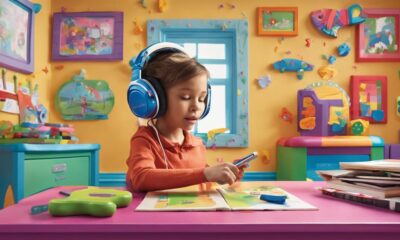
 Therapies and Interventions3 weeks ago
Therapies and Interventions3 weeks ago10 Auditory Processing Goals for Effective Speech Therapy
-

 Vetted2 months ago
Vetted2 months ago15 Best Oticon Hearing Aids to Improve Your Hearing in 2024
-

 Tinnitus2 months ago
Tinnitus2 months agoVA's Rating System for Tinnitus and Hearing Loss Explained
-

 Navigating the VA System1 month ago
Navigating the VA System1 month agoUnderstanding Bilateral Hearing Loss VA Rating Criteria
-

 Sign Language2 weeks ago
Sign Language2 weeks agoMastering the Art of Signing Letters in Sign Language
-

 Sign Language3 weeks ago
Sign Language3 weeks agoSign Language Emoji Translator: How to Communicate With Gestures
-

 Sign Language3 months ago
Sign Language3 months agoMedical Sign Language PDF: A Comprehensive How-To Guide
